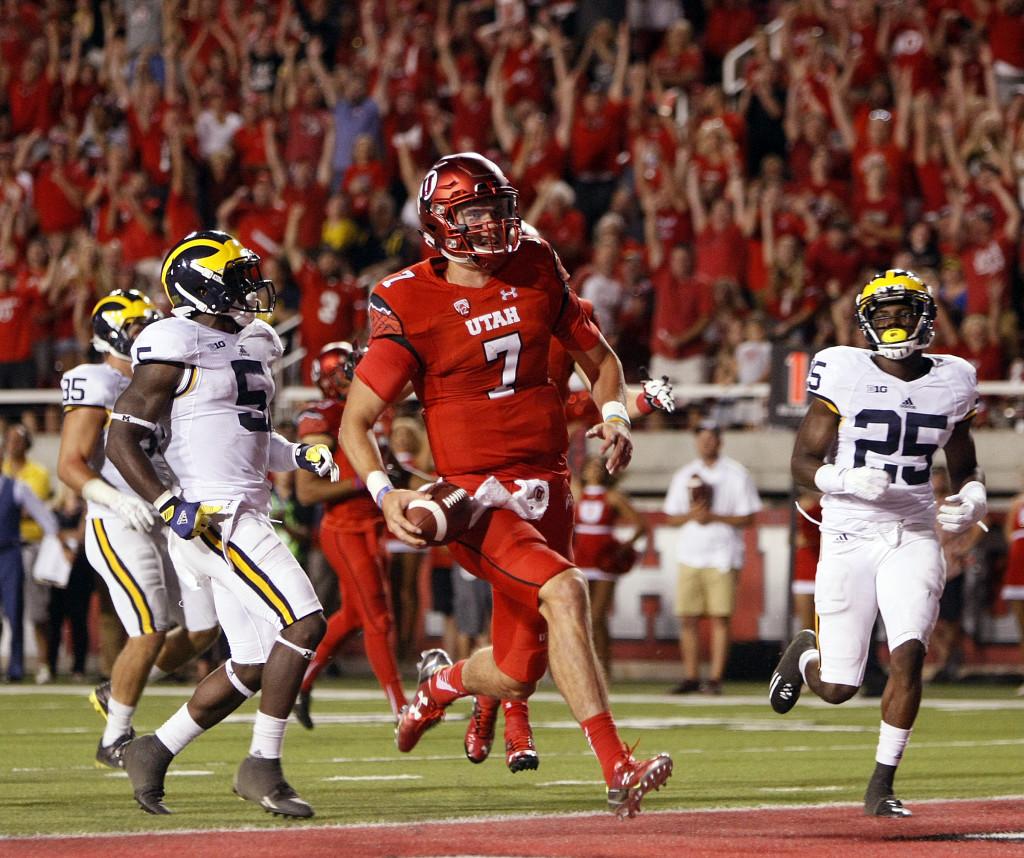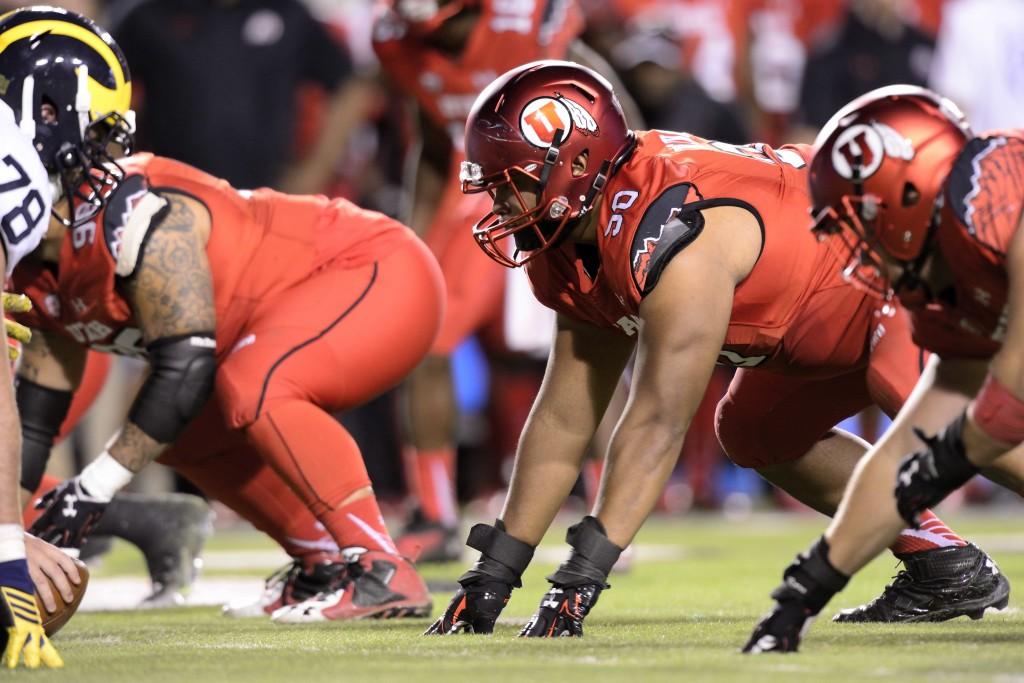Utah’s Offensive Potential Was the Biggest Take-Away
Brock Jensen
Utah fans need to be careful that they don’t overreact after just one game. There are definitely things that we can observe from the Michigan game, but we can’t allow ourselves to jump to conclusions regarding the Utes, or any conference team, before Pac-12 play has even started.
That said, I think the biggest takeaway from last Thursday’s game was Utah’s offense — more specifically, Travis Wilson and freshman Britain Covey.

This was a solid textbook performance by Wilson. He took care of the ball, made on-target throws and utilized his legs to move the offense. He performed the way the Utah coaching staff and fans have hoped he would making good reads and the right decisions in the contest with the Wolverines.
Whether it was Michigan’s gameplan or not, Utah didn’t have many opportunities deep down the field. Wilson didn’t get greedy and try to force balls into places they shouldn’t be. Instead, he checked down to running back Devontae Booker on numerous occasions and let him do something he’s good at — running after the catch.
Wilson’s legs proved to be effective, most notably on the 14-yard quarterback keeper for a touchdown. The defense bit hard on the fake, and he ran into the end zone basically untouched. Wilson extended plays and made some good throws outside of the pocket and, basically, was the quarterback we were all hoping for.
Yes, there will need to be some more downfield throws as the season goes on if Utah wants to be successful, but as for this performance, Wilson took what the defense gave him — short, accurate and on-time throws.
The recipient of many of those throws was the probably-shortest player on either sideline in Covey. The former prep standout has quickly established himself as an asset for this Utah team. Just four short months ago, he was graduating from Timpview High School in Provo, where he made his opponents look silly in his undefeated stretch as quarterback for the Thunderbirds.
The 5-foot-8, now-converted receiver/punt returner in Covey had as good a performance as could be asked in his first game as a Ute on Thursday. Though I’m sure there were first-game jitters, his performance on the field made him look like he was a savvy veteran.
Coming into the season, it wasn’t really known exactly how much of a role he would play. Standing under six feet and weighing in just a tick over 160 pounds, many believed Covey could not handle the rigors and physical play of the Pac-12.
But after just one game, it seems he will be a great talent in the slot position for the Utes. Covey had a few chances to showcase his quick feet and agile skillset, but we’ve just barely scratched the surface. Continue to watch his development in the offense and special teams as the season goes on, and the Utes may have found themselves a diamond in the rough.
Yes, Booker didn’t register a 100-yard rushing game. And yes, the offensive line play left some question marks. But overall, the offense showed a strong performance, and it will need to continue to put up, at least, those kinds of numbers and points when Pac-12 play begins.
Wilson showed us he is capable of leading Utah to wins, despite an up-and-down year last season. Covey looks like he could be a good candidate to replace the athleticism and talent of Kaelin Clay, and maybe even surpass it.
But it’s just one game. There are plenty of areas of improvement all around, including the offense, but the biggest takeaway for me was the solid play of the Wilson-led offense and the performance of a young, rising playmaker in Covey.
b.jensen@dailyutahchronicle.com
@brock_jensen02
Utah Defense’s Big Play Potential was the Biggest Take-Away
Tyler Crum
Heading into Thursday’s game against Michigan, many Ute fans were excited to see Heisman hopeful Devontae Booker run circles around the Wolverine defense, Tom Hackett and Andy Phillips to show why they are considered two of the country’s best special teams players, and the dominant Utah front seven to victimize Michigan’s inexperienced quarterback.
What happened on the field could not have been any different.

Booker tallied only 69 yards on 22 carries, and it took some strategic passing from Travis Wilson to get the Utes going offensively. “Automatic” Andy two missed field goals, and a questionable touchback call for Hackett left shifty return man Britain Covey to be the game’s special teams standout. The Utah defense that earned the wildly popular “Sack Lake City” nickname that made its way on the backs of this year’s MUSS T-shirts didn’t record a single sack for the first time in a game since 2013.
Whether Utah’s failure to meet preseason expectations is just a result of the minor kinks that appear in any team’s first game or if it is an indication of a whole new team dynamic for the Utes this season, it is clear the team will need to make improvements as it gears up for Pac-12 play. Despite some glaring issues, there were also many hopeful signs that the Utes will have a strong team this year, especially for the defense.
The biggest positive of Thursday’s game was the Ute defense’s ability to render Michigan’s running game completely ineffective. Michigan head coach Jim Harbaugh’s trademark offense saw the Wolverines trying down after down to pound the ball in between the tackles, but the Utes were having none of it. UM only managed to gain 76 yards on their 29 rushing attempts, and Utah’s front seven looked immovable when it came to stopping the run. By shutting down the Wolverine ground game, Utah’s front seven forced Michigan to air it out, allowing the secondary to make some big plays.
Utah defense’s inability to bring down UM’s Jake Rudock a single time behind the line of scrimmage may have come as a surprise to many, but that statistic fails to illustrate that the Utes pressured the quarterback and forced him to make mistakes all night. Rudock was able to complete 27 of his 43 pass attempts, but his three interceptions were key to the Utes’ victory. The first interception came on the Utah 21-yard line, ending the Wolverine’s first drive of the game and preventing them from possibly taking the 7-3 lead. The second interception was equally pivotal as it again ended a Wolverine drive at midfield and kept the game tied at 3-3. In the final quarter of the game, Justin Thomas’s pick-six cemented the Utes’ lead and was arguably the biggest play of the game.
When it came down to it, defense showed that it has the greater big play potential and length than any other unit on the team. Barring Travis Wilson’s 14-yard touchdown run, the offense and special teams had no big plays, and although it does not necessarily take big plays to win football games, in a desperately close fight like last Thursday’s competition, big plays made all the difference and kept the Utes in the game. While the Utah offense struggled in the first half, the defense kept them ahead and allowed them to find their rhythm in the second half of the game. The defense spent 30:16 on the field, more time than the Utah offense, and kept giving the offense more chances to score by forcing UM to punt and holding the Wolverines to 6-for-16 on third down conversions.
Looking ahead to this week’s match-up, I expect both sides of the ball to improve for the Utes, but the strength and run-stopping ability shown by the defense’s front seven paired with the secondary’s propensity for big plays should have fans feeling hopeful about Utah’s defense this season.
t.crum@dailyutahchronicle.com
@tylerfcrum


